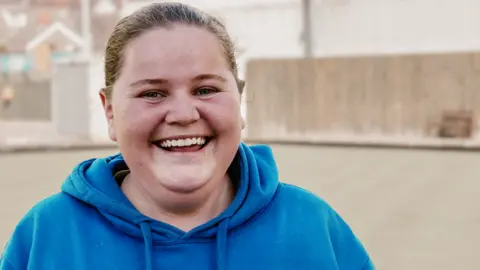When Elliott was taken into care at 12 years old, he was told to pack all his belongings into black bin bags.
A pendant given to him by his nan – who he did not know when he would see again – was lost on the way.
He is not the only child in care that this has happened to. BBC Wales has spoken to children in care, and young care-leavers, who say they were made to move their belongings in bin bags and saw them go missing as a result.
Elliott – now 15 – said moving his things in this way caused additional trauma to his experience of coming into the care system.

“The pendant that I lost when I went to my first placement, it meant a lot to me because my nan didn’t know when she would see me again when I moved into care,” he said.
“It was supposed to be my 18th birthday present, so my grandmother spent a lot of money on it, and it had a lot of sentimental value.”
Comfort items such as teddies and blankets also went missing when Elliott was moving between placements.
He said: “Having those pieces from home, it means a lot to us. It can mean the difference between breaking down the placement and keeping it up.”
During another move, a bin bag containing Elliott’s belongings broke.
“I grabbed my bag out of my social worker’s car and the bottom of it just ripped and all my clothes just fell out in the middle of the road,” he said.
“It’s dehumanising. If your child was moving out, you wouldn’t make them move in black bin bags, you would take the time out of your day to get duffle bags or suitcases and boxes as well.”
Jo-Anne, now 22, said that every time she moved placement as a child, she did so with black bin bags.
But there was one move she has never forgotten.

Jo-Anne’s belongings were placed in a bin bag, which went missing.
“There were photos of my older and younger sibling, we were separated practically as soon as we were put into care,” she said.
Those pictures were the only thing Jo-Anne had left to remember them by.
Her baby blanket was also lost during the move.
She added: “That’s something from home, that’s something that meant something to me, but they couldn’t look after it enough for me to keep it.”
When she asked what had happened to the bag, no one seemed to know.
“The local authority didn’t have them, the foster placements didn’t have them, and I kept questioning where were they and I never got to bottom of it,” she said.
“My best guess is that they’ve been used as rubbish, they’ve ended up in the bins because they were black bags and I’ve left them outside the house.
“Bin men are going to think its rubbish, let’s collect it.”
It left Jo-Anne feeling like she did not deserve her belongings.
“It made me feel very worthless,” she said.
“It made me feel like I wasn’t entitled to a normal suitcase to keep my things safe. I felt like I wasn’t entitled to normal belongings and that maybe there was no point in moving my things.”
Care leaver Angel said that when she was 19, she was unexpectedly asked to leave the hostel she was staying in.
Her belongings were packed in bin bags and handed to her at the front door.
When she unpacked them, she found clothes, personal photos and other items were missing.
“This made me feel worthless and lost,” she said.
“I have just had to continue on without half of my belongings and try and build afresh.”
The National Youth Advocacy Service (NYAS) is now running a campaign, called My Things Matter, asking local authorities to pledge never to ask a young person to move their belongings in a bin bag or throw away a young person’s belongings without their consent.
They have also asked local authorities to work with children in care to ensure they feel supported while moving.
It is not the first time campaigners have raised it, but they say practices like this are still common.

The campaign has also teamed up with social enterprise Madlug, set up by a youth worker in 2015, which donates a travel bag to a child in care for every bag it sells.
It is now donating bulk orders of free bags to local authorities that have signed a pledge.
Nine of the 22 local authorities in Wales have committed to the campaign pledge since it launched in 2022.
Jay Jeynes is the Welsh chairman of the Campaign Advisory Group at NYAS.
He is care-experienced himself and was also made to move his belongings in a black bin bag.
He is urging the remaining 13 Welsh local authorities to commit to the pledge.
“It is staggering how many people are still using black bin bags,” he said.
Mr Jeynes said the campaign is about empowering every child in care to be able to move their belongings with dignity.
He added: “No child deserves to carry their lives in a bin bag.”
A Welsh Government spokesperson said the belongings of children in care should be “treated with the utmost respect”.
They said: “A number of local authorities in Wales already pre-purchase holdall bags for the belongings of children and young people during periods of transition.
“Whilst we understand that there been occasions when these have not been used – primarily during emergencies – we fully expect all local authorities to better plan and use holdalls on all occasions.”
The Welsh Local Government Association, which represents local authorities in Wales, was asked to comment but declined.

